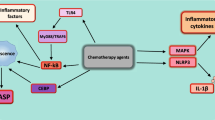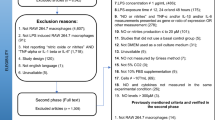Abstract
It has been well established that inflammation plays a critical role in cancer. Chronic inflammation promotes tumorgenesis and metastasis, which suggests that anti-inflammation drugs could act as a tumor suppressor. It is known that the peroxisome proliferator-activated receptor γ (PPARγ) has been implicated in anti-inflammatory responses; however, the anti-tumor effects of PPARγ have not been intensively investigated. In this study, we examined the effects of PPARγ in cancer. We show that the activation of PPARγ by its agonist rosiglitazone (RGZ) reduces cell proliferation rate in inflammatory and tumor-derived U937 cells. Treatment of RGZ suppresses the expression Toll-like receptor 4 (TLR4) and decreases the production of TNF-α in LPS treated U937 cells. This suggests that NF-κB signaling may be involved in anti-tumor effect of RGZ. Our results demonstrate a role of PPARγ in regulation of NF-κB signaling by modulating TLR4 expression and TNF-α production.




Similar content being viewed by others
References
Wu, S., Rhee, K. J., Albesiano, E., et al. (2009). A human colonic commensal promotes colon tumorigenesis via activation of T helper type 17 T cell responses. Nature Medicine, 15, 1016–1102.
Waldner, M. J., & Neurath, M. F. (2009). Colitis-associated cancer: The role of T cells in tumor development. Seminars in Immunopathology, 2009(31), 249–256.
Karin, M., et al. (2006). Nuclear factor-kappa B in cancer development and progression. Nature, 441, 431–436.
Mantovani, A., Allavena, P., Sica, A., & Balkwill, F. (2008). Cancer-related inflammation. Nature, 454, 436–444.
Grivennikov, S. I., Greten, F. R., & Karin, M. (2010). Immunity, inflammation, and cancer. Cell, 140(6), 883–899.
De Visser, K. E., Eichten, A., & Coussens, L. M. (2006). Paradoxical roles of the immune system during cancer development. Nature Reviews Cancer, 2006(6), 24–37.
Lin, W. W., & Karin, M. (2007). A cytokine-mediated link between innate immunity, inflammation and cancer. Journal of Clinical Investigation, 2007(117), 1175–1183.
Harmey, J. H., Bucana, C. D., Lu, W., Byrne, A. M., McDonnell, S., Lynch, C., et al. (2002). Lipopolysaccharide-induced metastatic growth is associated with increased angiogenesis, vascular permeability and tumor cell invasion. International Journal of Cancer, 2002(101), 415–422.
Coussens, L. M., & Werb, Z. (2002). Inflammation and cancer. Nature, 420, 860–867.
Dunn, G. P., Bruce, A. T., Ikeda, H., Old, L. J., & Schreiber, R. D. (2002). Cancer immunoediting: From immunosurveillance to tumor escape. Nature Immunology, 2002(3), 991–998.
Baldwin, A. S., Jr. (2001). Series introduction: The transcription factor NF-κB and human disease. Journal of Clinical Investigation, 2001(107), 3–6.
Karin, M., & Lin, A. (2002). NF-κB at the crossroads of life and death. Nature Immunology, 2002(3), 221–227.
Zoete, V., Grosdidier, A., & Michielin, O. (2007). Peroxisome proliferator-activated receptor structures: Ligand specificity, molecular switch and interactions with regulators. Biochimica et Biophysica Acta, 1771(8), 915–925.
Kliewer, S. A., Forman, B. M., Blumberg, B., Ong, E. S., Borgmeyer, U., Mangelsdorf, D. J., et al. (1994). Differential expression and activation of a family of murine peroxisome proliferator-activated receptors. Proceedings of the National Academy of Sciences United States of America, 91, 7355.
Issemann, I., & Green, S. (1990). Activation of a member of the steroid hormone receptor superfamily by peroxisome proliferators. Nature, 1990(3), 645–650.
Pascual, G., Sullivan, A. L., Ogawa, S., Gamliel, A., Perissi, V., Rosenfeld, M. G., et al. (2007). Anti-inflammatory and antidiabetic roles of PPAR gamma. Novartis Foundation Symposium, 286, 183–196. (discussion 196–203).
Kurebayashi, S., et al. (2005). A novel thiazolidinedione MCC-555 down-regulates tumor necrosis factor-α-induced expression of vascular cell adhesion molecule-1 in vascular endothelial cells. Atherosclerosis, 182, 71–77.
Strauss, D. S., & Glass, C. K. (2007). Anti-inflammatory actions of PPAR ligands: New insights on cellular and molecular mechanisms. Trends in Immunology, 28(12), 551–558.
Medzhitov, R., Preston Hurlburt, P., & Janeway, C. A., Jr. (1997). A human homologue of the Drosophila Toll protein signals activation of adaptive immunity. Nature, 388(6640), 394–397.
Huang, Q., Liu, D., Majewski, P., et al. (2001). The plasticity of dendritic cell responses to pathogens and their components. Science, 294(5543), 870–875.
Muzio, M., Bosisio, D., Polentarutti, N., et al. (2000). Differential expression and regulation of toll-like receptors (TLR) in human leukocytes: Selective expression of TLR3 in dendritic cell. Journal of Immunology, 164(11), 5998–6004.
Luo, J.-L., Maeda, S., Hsu, L.-C., Yagita, H., & Karin, M. (2004). Inhibition of NF-[kappa]B in cancer cells converts inflammation-induced tumor growth mediated by TNF[alpha] to TRAIL-mediated tumor regression. Cancer Cell, 6(3), 297–305.
Kiechl, S., Lorenz, E., Reindl, M., et al. (2002). Toll-like receptor 4 polymorphisms and pathogenesis. New England Journal of Medicine, 347(3), l85–l192.
Luo, J.-L., Kamata, H., & Karin, M. (2005). IKK/NF-κB signaling: Balancing life, death—a new approach to cancer therapy. Journal of Clinical Investigation, 115(10), 2625–2632.
Rossi, A., et al. (2000). Anti-inflammatory cyclopentenone prostaglandins are direct inhibitors of IκB kinase. Nature, 403, 103–108.
Straus, D. S., et al. (2000). 15-deoxy-Δ12, 14-prostaglandin J2 inhibits multiple steps in the NF-κB signaling pathway. Proceedings of the National Academy of Sciences of the United States of America, 97, 4844–4849.
Reaves, T. A., Chin, A. C., et al. (2005). Neutrophil transepithelial migration: Role of toll like receptors in mucosal inflammation. Memórias do Instituto Oswaldo Cruz, 100(Supp l), 191–198.
Eun, C. S., Han, D. S., et al. (2006). Attenuation of colonic inflammation by PPARγ in intestinal epithelial cells: Effect on Toll-like receptor pathway. Digestive Diseases and Sciences, 51(4), 693–697.
Acknowledgments
We thank the members of our laboratories for their insight and technical support. This work was supported by the following fundings: National Natural Science Foundation of China (No.30770782), Natural Science Foundation of Guangdong Province (No.10151008901000243), Science and Technology Program of Guangzhou City (No. 2010J-E111) as well as Science and Technology Planning Project of Guangdong Province (No. 2010B030700006).
Author information
Authors and Affiliations
Corresponding authors
Additional information
Chun-Zhi Wang and Yong Zhang contributed equally to this study.
Rights and permissions
About this article
Cite this article
Wang, CZ., Zhang, Y., Li, XD. et al. PPARγ Agonist Suppresses TLR4 Expression and TNF-α Production in LPS Stimulated Monocyte Leukemia Cells. Cell Biochem Biophys 60, 167–172 (2011). https://doi.org/10.1007/s12013-010-9136-6
Published:
Issue Date:
DOI: https://doi.org/10.1007/s12013-010-9136-6




